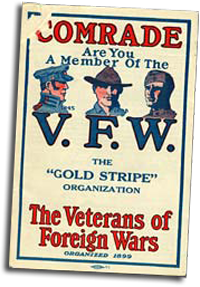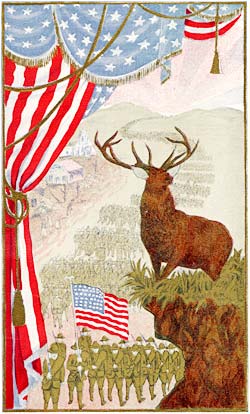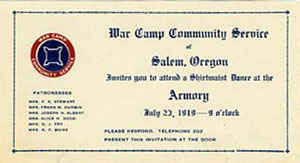 The VFW was active helping veterans and survivors as well as promoting Americanization. (OSA, Oregon Defense Council Records, Publications and Ephemera, Box 8, Folder 1)
The VFW was active helping veterans and survivors as well as promoting Americanization. (OSA, Oregon Defense Council Records, Publications and Ephemera, Box 8, Folder 1)
Nearly all Oregonians personally knew someone serving in the military during World War I. Father, son, brother, coworker, classmate, fellow church or fraternal organization member, or the boy from the next farm over; the connections motivated those on the home front to work hard to support the boys "over there." Obviously, society punished those who, for one reason or another, failed to conform. But for the majority of Oregonians, there was a sincere unity of purpose, a common cause that transcended complaints about food shortages or the management of local war efforts.
These people came together in communities across the state to organize, cooperate, share, and enjoy comradery during extraordinary times. They recognized they were living through an important chapter of history - "through the greatest crisis the world has ever known." Despite the daunting amount of work, they resolved to make it as enjoyable as possible. For many, "the work was far more joyous than laborious..." as "every heart was filled with true patriotism." The following organizations and places represent a few of the countless numbers working to keep spirits of Americans high during World War I.
The Four Minute Men Take to Theaters
In an age before television and widespread radio, live oration such as lectures, speeches, and readings provided a welcome and lively form of entertainment. Capitalizing on this, the federal Committee on Public Information quickly organized a vast network of "Four Minute Men" to provide an endless supply of speakers on patriotic subjects. The name Four Minute Men was derived from a combination of references to the Minute Men from the Revolutionary War and to the approximate time it took to change a reel of film at a motion picture theatre. While the reel was being changed, the volunteer would stand and speak for four minutes on a subject of national importance. By October 1917, the organization had grown to number 15,000 speakers nationwide.
Generally, local people with standing in the community gave talks. The goal was to "preserve individuality and forcefulness of expression" within four minutes and by all means within the policy limits and "character of the original message formulated in Washington...." Local chairmen were advised to choose young lawyers and businessmen who could adhere to the four minute limit "rather than originate speeches." There was concern about "well known speakers [who] are too accustomed to longer speeches, with room for anecdotes and introduction...."
Throughout, the focus remained on effectively communicating the message: "Every speaker is expected to have his subject in hand before speaking. He should arrange with the local chairman not to appear until he has confidence in his ability to properly present his message. If a speaker discovers by trial that he is not suited to the work and that he is not winning his audience, he should either resign or request the chairman to assign him to some other work...."
As the program progressed, it branched into variations including churches, women, colleges, and "Junior Four Minute Men." Even music followed as specially prepared songs were published with song leaders on hand "to encourage the audiences of motion-picture theaters in community singing." Speaking topics included: Why are We Fighting?, the Liberty Loan, the Red Cross, Food Conservation, What Our Enemy Really Is, Unmasking German Propaganda, and The Nation at Arms.
Oregon's Four Minute Men organization began in June 1917 and grew quickly. During the three weeks of the Fourth Liberty Loan Campaign in the fall of 1918, the Oregon Four Minute Men sent out 800 speakers and reached 400,000 people. The organization also distributed publications released by the Committee on Public Information. As an example of one effort, it sent more than 150,000 pamphlets to the Loyal Legion of Loggers and Lumbermen in Oregon.
Klamath County Rallies to the Cause
In Klamath County, the effort began the morning after the declaration of war on April 6, 1917. The Grand Army of the Republic, "our noble veterans of '61," called a patriotic rally with numerous "inspiring" speeches and music by the high school chorus. Three days later, there was a big send off for the first volunteers as 16 young men, nearly half high school students, left for Portland. A few days later, another parade was given to honor the Fort Klamath recruits.
 Elk's Lodges and other fraternal organizations were involved in social ceremonies such as flag raisings on the home front. This image is from a June 1918 Flag Day program for The Dalles Lodge. The ceremony included an orchestra, a singing quartette, two soloists, a prayer and alter service, and an address. (OSA, Oregon Defense Council Records, Publications and Ephemera, Box 8, Folder 1)
Elk's Lodges and other fraternal organizations were involved in social ceremonies such as flag raisings on the home front. This image is from a June 1918 Flag Day program for The Dalles Lodge. The ceremony included an orchestra, a singing quartette, two soloists, a prayer and alter service, and an address. (OSA, Oregon Defense Council Records, Publications and Ephemera, Box 8, Folder 1) While the Four Minute Men strictly limited the length of their talks, other orators spoke at events without time limits. Memorial Day, the Fourth of July, and other patriotic celebrations provided ample opportunity to expound on patriotism and the war effort. In between major celebrations, Oregonians held countless rallies and flag raisings, generally with numerous addresses by local dignitaries or special guests from outside the community. One "mass meeting" included professors from the University of Oregon and Columbia University who "gave splendid talks and made a stirring appeal for more help in the Red Cross work rooms." Another featured Sergeant Wells, a Canadian soldier and "hero of Ypres" who gave a "stirring tale of his experiences."
Klamath Falls saw numerous flag raisings such as one put on by the Elk's fraternal organization on June 14, 1918 with "Frank Irvine, the blind orator and editor of the Oregon Journal, as chief speaker." Just a few weeks later, the "Fourth of July was a huge success, with a beautiful parade and an exceptionally good oration delivered by Rev. Lowdher. A flag raising at the Elk's Temple was also part of the program." Another big celebration followed that September but was a washout: "...the evening was to have been a parade for the mothers, sisters and wives of the enlisted men, and unusual pains had been taken to construct attractive floats, but on account of it raining, the parade could hardly be called a success."
Music played an important role in boosting the spirits of community. The State Council of Defense for Oregon encouraged the formation of "liberty choruses" in each county "to conduct all singing during the duration of the war, especially during drives...." Most counties honored the request and in Klamath County, Miss Evelyn Applegate kept busy leading the local liberty chorus as chairwoman and director. The chorus performed often in Klamath Falls but also made trips to Fort Klamath, Merrill, Swan Lake, and Keno. In addition to the liberty chorus, music for local events consisted of other choruses, various bands, orchestras, soloists, and other performers, some from outside of the community.
National League of Women's Service
The Portland headquarters of the National League of Women's Service cooperated with the Red Cross and other organizations to organize the work of women "along lines of constructive patriotism" for the war effort. Through the league, Portland women helped with a wide range of liberty loan, war stamp, and relief drives. They assisted draft boards, worked in hospitals, and volunteered for Uncle Sam's Kanning Kitchen. But some of the most useful service was social in nature.
The women organized Portland headquarters into an impressively detailed structure to accomplish their goals. The Welfare Committee managed draft dinners; ran the women's division of the city's Fourth of July Parade; sold 5,000 dinner tickets for Red Cross Day at Oaks Amusement Park; ran a profitable canteen; and sold tickets to the "Army vs. Shipbuilders" football game, the league's photo play "Crashing Thru to Berlin; and the "Shipyard Minstrel Show," among other activities.
 An invitation to a "Shirtwaist" dance put on by the War Camp Community Service. (OSA, Oregon Defense Council Records, Publications and Ephemera, Box 8, Folder 3)
An invitation to a "Shirtwaist" dance put on by the War Camp Community Service. (OSA, Oregon Defense Council Records, Publications and Ephemera, Box 8, Folder 3) The Social Committee was even more intricately organized with executive and general committees as well as a dance detachment, gymnasium girls' social auxiliary, college sorority detachment, and three divisions of the comrades club, to name a few. These, and other, subsets of the league entertained thousands of soldiers and sailors at dances and other events. The Auditorium, Multnomah Club, Benson Hotel, Laurelhurst Club, and Yacht Club played host to league dances put on by detachments, each numbering 100 "girls" led by a commandant, majors, and captains. Eventually, additional detachments from Portland department stores were formed.
Dozens of dances, sometimes in conjunction with the War Camp Community Service, gave enlisted men stationed nearby, such as at the Vancouver Barracks, a regular social outlet throughout the year. In fact, "the plan was to have a dance every night at the B'Nai Brith Hall." The committee also coordinated "splendid local talent" to perform at the dances, dinners and related events. Orchestras, bands, soldiers' choruses, organists, and speakers filled the bill.
When the league wasn't organizing dances and providing hundreds of dance partners to lonesome soldiers and sailors, it was operating transportation and related services. Its "Soldiers' and Sailors' Rides" division provided the servicemen with transportation "on the highway or about the city." It also supplied over 200 automobiles for YMCA entertainers who were taken to the Vancouver Barracks several times a week. Many of the league's cars showed up festooned with decorations in frequent parades as well. The cars also proved handy to transport members of the "Cheer-Up Committee" to the hospital at Vancouver Barracks. Every day groups would go from 1:30 to 3:30 p.m. "when convalescent soldiers were taken out for airing." The committee would furnish the soldiers with "phonographs and records, stereopticon views and glasses, entertainers, music, flowers and vases." The league's motor pool drove other women to meetings and events to give public speeches throughout the area on patriotic subjects.
View governor's proclamation related to "Smileage Books." (PDF)
War Changes Traditional Gender Roles
The organizing, celebrating, performing, and other work Oregon women took on with incredible energy resulted in some unintended consequences, both on a family and social level. World War I acted as a powerful catalyst for social change since it required people to break from their traditional roles and be creative to meet the common goals. One young and keen observer, Inez Bell of Klamath Falls, marveled at the changes:
Notes
(Oregon State Defense Council Records, State Historian's Correspondence, Box 1, Folder 4, 38; Publications and Ephemera, Box 8, Folder 2, 4)